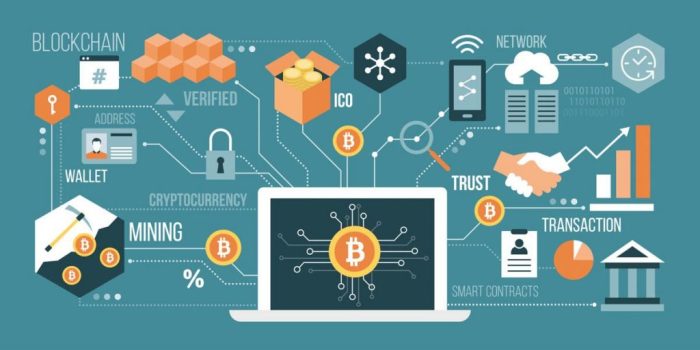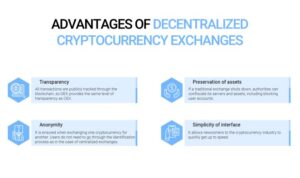As The Role of Crypto in the Future of Work takes center stage, this opening passage beckons readers with american high school hip style into a world crafted with good knowledge, ensuring a reading experience that is both absorbing and distinctly original.
Cryptocurrency is not just a buzzword anymore; it’s reshaping the future of work in ways we never imagined. From revolutionizing traditional work structures to influencing how we get paid, the impact of crypto is undeniable. Let’s dive into how this digital revolution is changing the game for freelancers, remote workers, and the entire workforce as a whole.
The Impact of Crypto on the Future of Work
Cryptocurrency is drastically changing the landscape of traditional work structures. With the rise of blockchain technology, various industries are experiencing a revolution unlike anything seen before. Smart contracts are reshaping employment relationships, while decentralized finance (DeFi) is influencing the way freelancing and remote work operate.
Blockchain Technology Revolutionizing Industries
Blockchain technology is revolutionizing industries such as finance, supply chain, healthcare, and real estate. By providing transparent, secure, and immutable records, blockchain is enhancing trust and efficiency in various sectors.
Role of Smart Contracts in Reshaping Employment Relationships
Smart contracts are self-executing contracts with the terms of the agreement between parties directly written into code. These contracts automate and enforce the negotiation or performance of a contract, reducing the need for intermediaries and streamlining processes in employment relationships.
Decentralized Finance (DeFi) Influencing Freelancing and Remote Work
Decentralized finance (DeFi) is transforming the way freelancers and remote workers access financial services. With DeFi platforms offering decentralized lending, borrowing, and payment solutions, individuals can seamlessly engage in work opportunities without traditional banking constraints.
Crypto Wages and Payments

Receiving salaries in cryptocurrency comes with both advantages and challenges. On one hand, it offers faster transactions, lower fees, and increased privacy compared to traditional banking systems. However, the volatility of crypto prices can pose a risk to employees who depend on stable income.
Streamlining Cross-Border Transactions
- Crypto payments are revolutionizing cross-border transactions for remote workers by eliminating the need for expensive currency conversions and lengthy processing times.
- Workers can receive payments instantly, regardless of their geographical location, leading to greater financial inclusion and accessibility.
Risks Associated with Volatility
- The fluctuating value of cryptocurrencies can impact the purchasing power of employees, causing uncertainty in budgeting and financial planning.
- Employees may experience sudden changes in the value of their wages, affecting their overall financial stability and well-being.
Platforms Facilitating Crypto Payroll Services
- Emerging platforms are offering crypto payroll services to businesses, enabling them to pay employees in digital assets efficiently and securely.
- These platforms help automate payroll processes, ensure compliance with regulations, and provide a seamless experience for both employers and employees.
Decentralized Autonomous Organizations (DAOs) in the Workplace: The Role Of Crypto In The Future Of Work

Decentralized Autonomous Organizations (DAOs) are revolutionizing traditional organizational structures and decision-making processes in the workplace. By leveraging blockchain technology, DAOs enable transparent, decentralized decision-making without the need for a central authority.
Changing Organizational Structures
- DAOs eliminate hierarchical structures and empower employees to participate in decision-making processes.
- Smart contracts within DAOs automate tasks and ensure compliance with predefined rules.
- DAOs foster a culture of transparency, accountability, and inclusivity within organizations.
Successful DAO Implementations, The Role of Crypto in the Future of Work
- The DAO, a crowdfunded venture capital fund, was an early example of a DAO that raised over $150 million before facing a security breach.
- Aragon is a platform that enables the creation and management of DAOs, empowering organizations to govern themselves efficiently.
- MolochDAO is a grant-giving DAO focused on funding Ethereum development projects through community governance.
Benefits of Utilizing DAOs
- Efficient decision-making processes due to automation and predefined rules.
- Enhanced transparency and accountability within the organization.
- Increased employee engagement and empowerment through participation in governance.
Potential Drawbacks of Relying on DAOs
- Security vulnerabilities and susceptibility to hacking attacks, as seen in the case of The DAO.
- Challenges in resolving disputes or conflicts within a decentralized system without a central authority.
- Legal and regulatory uncertainties surrounding the operation and governance of DAOs.
Skill Development and Education in the Crypto Economy

In the rapidly evolving landscape of the crypto economy, the demand for individuals with crypto-related skills is on the rise. As blockchain technology and cryptocurrencies continue to gain mainstream adoption, the need for professionals who understand these concepts is more crucial than ever.
Importance of Blockchain Education and Training Programs
Blockchain education and training programs play a vital role in preparing individuals for careers in the crypto-centric industry. These programs provide students with the necessary knowledge and skills to navigate the complexities of blockchain technology, smart contracts, and decentralized finance. By offering hands-on experience and real-world projects, these programs ensure that graduates are well-equipped to succeed in the crypto economy.
- Curriculum covering blockchain fundamentals, cryptocurrency trading, and smart contract development.
- Hands-on projects and real-world simulations to apply theoretical knowledge.
- Networking opportunities with industry professionals and experts.
- Certifications to validate skills and knowledge in the crypto space.
Revolutionizing Credentialing with NFTs
Non-Fungible Tokens (NFTs) are revolutionizing the concept of credentialing and certifications in the crypto economy. By tokenizing credentials, individuals can prove ownership and authenticity of their qualifications on the blockchain. This not only enhances security and transparency but also provides a more efficient way to verify skills and achievements.
NFTs are transforming the way we think about digital ownership and authenticity, extending their application beyond art and collectibles to academic and professional credentials.
Staying Updated with Evolving Trends
In the fast-paced world of crypto, staying updated with evolving trends is essential for career growth. As new technologies and innovations emerge, professionals need to adapt and upskill to remain competitive in the job market. By participating in workshops, attending conferences, and engaging with online communities, individuals can stay ahead of the curve and position themselves for success in the crypto economy.
- Continuous learning through online courses and webinars.
- Engagement with industry thought leaders and experts on social media platforms.
- Exploration of emerging blockchain use cases and applications.
- Adaptation to regulatory changes and compliance requirements in the crypto space.


